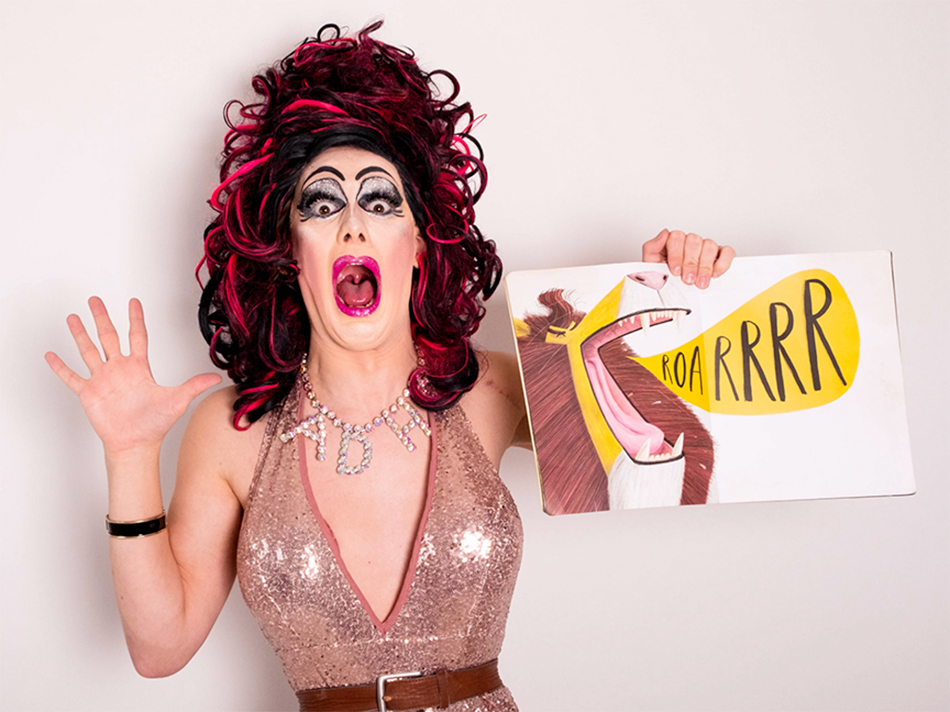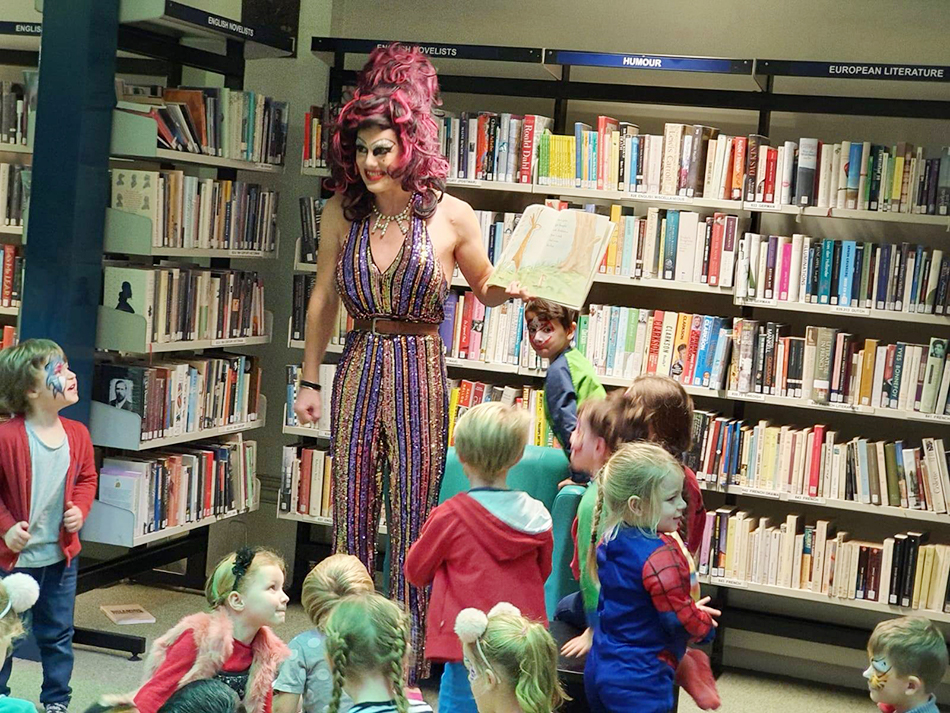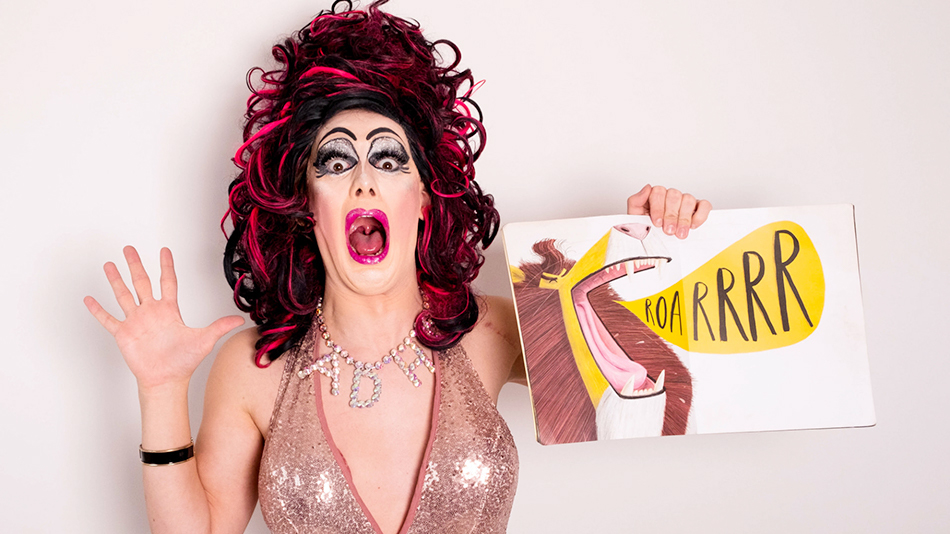Story hours in libraries normally involve librarians reading tales of anthropomorphic farm animals, not men dressed in women’s clothes. Aiming to spread love, empathy and acceptance, drag queens have been finding their way into libraries across the UK. Does it work well?
In a corner of a local library, some children are sitting with parents on the floor, some are standing together near the bookshelves. Laughter and cheers break forth from time to time, the audience are enjoying a story hour on the weekend.
Standing in the front, a man holds a picture book in his hands. Wearing a fluffy red and black long hair and a female shining party costume, he blinks his sparkling big eyes and mimics the dialogues with his voice up and down like an exciting roller coaster.
This is Drag Queen Story hour UK, where the drag queen Aida H Dee has been reading stories to little kids in various British libraries since 2017. Aida’s performance is very different from a traditional concept of the story hour, but he has a special reason for that.
“The fact that I was dressed in drag was an inclusiveness lesson that was going on,” said the 25-year-old young man. “It’s about getting them to accept and understand that a drag queen, somebody who’s dressed up in funny wired outfits, is completely OK and safe.” Furthermore, “It’s explaining that people are different, and just because they are different doesn’t mean they need to be treated differently.”

Aida’s first experience of performing in drag happened in secondary school, where he used to be a victim of school bullying.
At the age of 15, he got a main character in the school play. It was an evil villainess, and he found himself get stuck in a dilemma. “It was an all-boys school, and I have to dress up as a drag to play the part,” said Aida. “At that time, I was badly bullied. Looking back, I had guts to do that, I had to say. But I was actually worried that after I did that, I would get bullied even more…”
Aida is not the only person who has experienced bullying at school. A fifth of British young people aged 12-20 have been bullied within the last 12 months, according to a study among 7,347 students by charity Ditch the Label in 2019. Among them, around 62% were bullied by a classmate and 37% were by somebody at school that they didn’t know.
The school bullying was not the only terrible experience for Aida. He also suffered from an abusive relationship with his father at home. A few years ago, there was a fight in their household. It didn’t start with Aida but suddenly turned to him, and his father pushed him down the stairs.
Aida dislocated his shoulder and ended up in hospital. It was out of socket and looked a bit like Lady Gaga’s appearance in the video Born This way. “She’s got those sharp things that placed on her shoulder. It looked like that. [My shoulder] just looked really odd,” said Aida.
While injured and in that position, Aida’s father, instead of consoling him, spoke something hurtful that “this is what happens when you act like a girl…”
Looking back for the reason of running the Drag Queen Story Hour UK, Aida said firmly: “Why I read stories to children? To stop the type of the hatred that I’ve got.”
A few months after his father’s awful words, there happened a performance of dressing in drag. Aida took part in it and sent his father an invitation. He wanted that man to come and see him performing on stage. He hoped something could be changed.
The performance went well, but his father didn’t show up, and nothing really changed. “What I found was after that, just because I did a little bit of drag and invited him to it, it didn’t really do any good,” said Aida. “It wasn’t preventing it happening again with other people.”
But hope was not far away. A few weeks later, Aida got a special invitation to a nursery in London to read stories to little kids. He enjoyed the experience very much and also started thinking about the role that he could really play.
The behaviour of bullying can be reduced by good education, according to Aida. “The idea that there are people out there who get bullied for having freckles, is very obvious as an adult, but it’s one of those things that if you end up being a nasty person or a meanie, you’ll end up being a meanie, because you’re kind of being taught to be a meanie when you are a kid,” said Aida, the first drag queen in Europe who read stories to children in a nursery.

At first, Aida read stories that are just fun and entertaining, such as We Are Going on a Bear Hunt. But as he was asked back to same places to read stories again and again, he thought he could teach more things than just accepting that somebody could dress up in funny clothes. Then, he started adding LGBT inclusiveness stories and other stories with various awareness, such as racism, autism, ADHD, people who are disabled, blind, or can only speak with sign languages.
Aida said, his story hours were a mixture of both entertainment tool and educational tool. “If a child was to come to only one story time with me, I would consider it a failure if he or she didn’t go away having had fun.
“But over the course of the period of time, I’d want them to start being taught certain empathetic accents, such as if you see somebody is being bulled, you have the power to stop it; or if somebody is a girl but was born as a boy, you have the power to be nice.”
Children aged 0-8 are very suitable for Drag Queen Story Hour UK. However, adults can also get profound lessons from it. Aida said: “If you are an adult and you aren’t so sure about LGBT people, or aren’t so sure about black people, or aren’t so sure about people who might be disabled, how about you come alone, because I’m sure I can teach you something as well.”
Among books that Aida reads to children, one in third are about LGBT awareness, and he believes those stories are of great value for kids. “There should always be LGBT representation within children’s lives,” said Aida. “Not because they might be gay, or not because we want to turn them gay either. And it doesn’t work that way.
“But because if they’re not gay, they’ll know it exists. And if it’s introduced to them in a positive way, they’ll react positively even when they are older. If they are gay, then they’ve got representation, which is all that anyone needs to accept themselves.”
Aida used to struggle about his sexual orientation and had experienced a hard time on accepting himself as a gay boy. In Year 10, he had heard the word “camp” and understood that boys could be effeminate. Occasionally, some thoughts came to his mind, but he couldn’t figure them out and had no idea.
One day, he passed through a long corridor in school. Just as he walked into it, he started thinking about himself: “I am camp. I am effeminate…,” the little boy became a bit upset, and the thoughts continued: “If you are camp and you are effeminate, therefore, you are gay…”
With all those ideas in mind, the innocent young boy reached the end of the corridor. Knowing almost nothing about LGBT, Aida started a self-loathing process. “I admitted to myself that ‘I’m not gay. I’m definitely not gay.’ And I ended up changing my personality,” said Aida. “I stopped myself from doing something that may make them think I’m gay, and it took a good two years until I ended up accepting myself.”
Aida finally confirmed his sexual orientation when he was about to turn 17. He believes if he had known any story involving LGBT awareness, his experience might have been different. “If I’ve had a children’s book at a young age read to me, discussing that process in life that I was going to have to go through, I’m pretty sure that I wouldn’t have self-loathed myself, and I would have ended up realising I was just a camp or a gay boy,” said Aida.
According to NHS, LGBT people suffer more commonly from mental health problems such as depression or self-harm than others. In 2019, a study by gov.uk showed that 24% of 108,000 LGBT people had accessed mental health services within the last 12 months; In 2018, charity Stonewall reported that 52% of 5,000 LGBT people across England, Scotland and Wales had experienced depression in the last year.
Higher rate of mental health problems within LGBT people “may be linked to their experience of discrimination, homophobia or transphobia, bullying, social isolation, or rejection because of their sexuality,” added NHS. Therefore, education on relevant acceptance and tolerance within society are of great significance.
Aida learnt from his friend that some people wouldn’t voice the idea that they thought LGBT as an adult’s content, which he thinks a big issue. “Because the idea that you think gay could be an adult’s concept is the day that you realised that you wouldn’t accept a gay family, and gay fathers or gay mothers,” said Aida. “Being gay is an adult’s content, it’s not how it works.”
Audience at Drag Queen Story Hour UK come from different types of families.Aida said, reading diverse stories to children who have two dads or two mums, was like “preaching to the choir”, because they had already got the lesson from their family.
But if he reads stories to children who have a mum and a dad about the fact that there are kids who have either just two mums or two dads, then it would be a lesson taught. “It’s telling them that it exists. Telling them in a positive manner, so that they’ll react positively when they are older,” said Aida.

Teaching kids at a younger age about the existence of different types of families is a wise way to prevent the bullying of that, according to Aida. “The last thing that I’d ever wanted is a 13 or 15 or 17-year-old find out that two daddies and two mummies exist, for them to stop bullying those kids because they don’t have a father or because they don’t have a mother,” added him.
While Aida is tackling bullying by reading diverse stories to children, he’s still a victim of it himself. “You probably wouldn’t be surprised if I tell you I do get hate mail”, said Aida. “On a regular basis, for three years, at least once a week, I have had the hate mail telling me to commit suicide, or the hate mail telling me that I’m going to hell…”
The hate comes from a mixture of people who are homophobic and people who are anti-gay, but the majority is because of misunderstanding, according to Aida. He said: “Those who are scared of gays, tend to completely misunderstand what is actually going on in a story time.” Therefore, he would invite them to join his story time. “The moment they see a video or have actually attended one, they completely understand,” added he.
Sometimes people keep asking: “You could do what you do out of drag, but why do you have to be in drag?” And Aida’s answer would always be: “Why wouldn’t I? Why do people hire clowns to birthdays? Surely that clown could do what they do out of their costumes.” He said, it was from that moment, people started realising that his job was just a clown.
However, for people who are anti-gay, Aida admitted that there was nothing much that he could do. “I living my life is wrong in their eyes, let alone need me doing an educational story time,” said Aida. “So, I can’t win it anyway in the eyes of those people without actually admitting the fact that I’m pretending to be gay.”
The hate that Aida has got is definitely negative, but he regarded it as a fuel to the fire inside him. “If I didn’t get those messages telling me how wrong I am for teaching inclusivity, I wouldn’t have a reason to be doing what I’m doing anyway in the first place,” said Aida. “I suppose the time in my life where I don’t get abuse for teaching kids about acceptance, it is probably the time of my life that I’d hang up the wig and move on to actually using my degree in mathematics.”
Normally at the end every Drag Queen Story Hour UK, there is a meeting section, where the kids come to Aida and tell him about themselves, such as their favourite colours, what they’re going to do with their day, or their favourite ice cream flavours. Even the very shy kid will open up and start talking to him. Aida said, being able to be interactive with these children and see the shiest kids come out from their shells, was always his biggest moment.
With the coronavirus pandemic, the offline story time has been cancelled and Aida’s favourite meeting session cannot happen for a while. But he has been holding online story hours every week and continuing telling diverse stories to children.
Looking forward, Aida has a hope that he thinks might be too difficult to realise. “My hope would be that there is no hate or any kind of prejudice in the world,” said he. “But that’s a bit unrealistic. It’s always going to exist no matter how much I want it to be.”
But there is a hope, there is a way. “People look at slave trade nowadays look back on it and think how abhorrent and disgusting it was, and it should never come back,” said Aida. “I want people in the future to look on the homophobia and the prejudice on any types of people at all, the idea that you look at somebody for being different, I would like them to look back in the same way that people look at slave trade.”
Find more information on Drag Queen Story Hour UK at: https://www.dragqueenstoryhour.co.uk/
